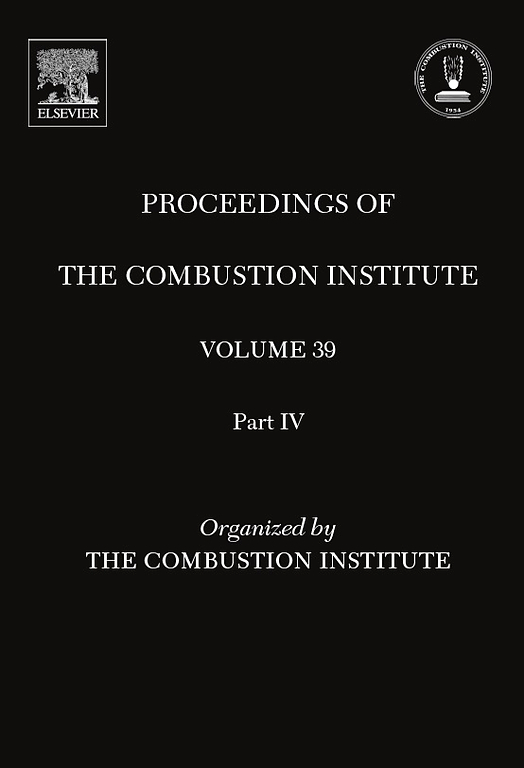研究氨和甲醇-柴油混合物在船舶发动机反应性控制压缩点火模式中的应用
IF 5.2
2区 工程技术
Q2 ENERGY & FUELS
引用次数: 0
摘要
有必要采用氨和甲醇等低碳燃料来使船舶脱碳。氨和甲醇的自燃温度较高,这使得在传统柴油发动机中使用这些燃料具有挑战性。此前的研究表明,在反应性控制压缩点火(RCCI)模式下运行传统柴油发动机,有可能在不影响发动机性能或排放的情况下使用低碳燃料。本文综合比较了甲醇柴油和氨柴油两种燃料下RCCI发动机的特性。实验在6.7 L康明斯ISB发动机上进行,用于甲醇柴油RCCI。在Converge软件中建立了三维CFD数值发动机模型,并用实验数据进行了验证。在相同的燃料能量下,用氨柴油混合物代替甲醇柴油混合物,研究了氨柴油混合物的RCCI。在燃料能量不变的情况下,预混能比在5% ~ 95%之间变化,同时保持发动机其它运行参数不变。RCCI燃烧的最佳案例是根据最大总指示热效率和最小温室气体排放来选择的。甲醇-柴油RCCI(用甲醇取代83%柴油质量获得)的最大总指示热效率比氨-柴油RCCI(用氨取代65%柴油质量获得)高20%,比常规柴油燃烧高13%。总体而言,本研究为使用甲醇和氨作为船用发动机的可持续燃料,选择最佳的预混能比以实现高效的RCCI燃烧提供了方向。本文章由计算机程序翻译,如有差异,请以英文原文为准。
Investigating the use of ammonia- and methanol-diesel blends in reactivity controlled compression ignition mode for marine engines
There is a need to adopt low-carbon fuels such as ammonia and methanol to decarbonize the marine fleet. The higher autoignition temperatures of ammonia and methanol make it challenging to use these fuels in conventional diesel engines. Previous studies have demonstrated that operating a conventional diesel engine in the Reactivity Controlled Compression Ignition (RCCI) mode has the potential to utilize low-carbon fuels without compromising engine performance or emissions. This study comprehensively compares the RCCI engine characteristics when methanol-diesel and ammonia-diesel are used as fuels. Experiments were conducted in a 6.7 L Cummins ISB engine for the methanol-diesel RCCI. A 3D CFD numerical engine model was developed in the Converge software and validated with experimental data. The ammonia-diesel RCCI was studied by replacing the methanol-diesel blend with the ammonia-diesel blend for the same fuel energy. The premixed energy ratio was varied from 5 % to 95 % for the constant fuel energy, keeping all other engine operating parameters the same. Best cases for RCCI combustion were chosen based on maximum gross indicated thermal efficiency and minimum greenhouse gas emissions. The maximum gross indicated thermal efficiency for the methanol-diesel RCCI (obtained by substituting 83 % diesel mass with methanol) was 20 % higher than that of ammonia-diesel RCCI (obtained by substituting 65 % diesel mass with ammonia) and 13 % higher than that of conventional diesel combustion. Overall, this study provides directions on using methanol and ammonia as sustainable fuels for marine engines, selecting the optimal premixed energy ratios to achieve efficient RCCI combustion.
求助全文
通过发布文献求助,成功后即可免费获取论文全文。
去求助
来源期刊

Proceedings of the Combustion Institute
工程技术-工程:化工
CiteScore
7.00
自引率
0.00%
发文量
420
审稿时长
3.0 months
期刊介绍:
The Proceedings of the Combustion Institute contains forefront contributions in fundamentals and applications of combustion science. For more than 50 years, the Combustion Institute has served as the peak international society for dissemination of scientific and technical research in the combustion field. In addition to author submissions, the Proceedings of the Combustion Institute includes the Institute''s prestigious invited strategic and topical reviews that represent indispensable resources for emergent research in the field. All papers are subjected to rigorous peer review.
Research papers and invited topical reviews; Reaction Kinetics; Soot, PAH, and other large molecules; Diagnostics; Laminar Flames; Turbulent Flames; Heterogeneous Combustion; Spray and Droplet Combustion; Detonations, Explosions & Supersonic Combustion; Fire Research; Stationary Combustion Systems; IC Engine and Gas Turbine Combustion; New Technology Concepts
The electronic version of Proceedings of the Combustion Institute contains supplemental material such as reaction mechanisms, illustrating movies, and other data.
 求助内容:
求助内容: 应助结果提醒方式:
应助结果提醒方式:


